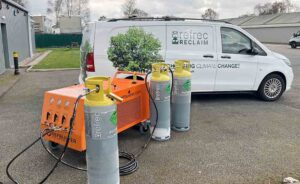Scientists seek way to make ammonia production more sustainable
7th August 2022
USA: Scientists at the US Department of Energy’s Argonne National Laboratory have joined efforts to find a way to reduce the environmental impact of producing ammonia.
While it is of global importance as a major ingredient in the production of fertilizers, ammonia has, of course, also been used for years in much smaller quantities as an efficient industrial refrigerant.
Despite its reputation as a natural, environmentally-friendly refrigerant, ammonia also contributes significantly to the world’s greenhouse gas emissions and fossil fuel use. It generally relies on the Haber-Bosch process developed in the early 1900s – a process which relies heavily on non-renewable fossil fuels and contributing to the atmospheric emissions of both carbon dioxide and methane.
Now researchers at Argonne National Laboratory have modelled how much it would cost to use more environmentally friendly methods that emit less carbon to produce ammonia.
“The ultimate goal is to use renewable or nuclear energy and clean hydrogen to produce it instead,” said Argonne senior scientist Amgad Elgowainy.
Elgowainy and his colleagues used Argonne’s Greenhouse gases, Regulated Emissions, and Energy use in Technologies (GREET) model to estimate the environmental impact of ammonia production from various energy sources. Then, they used a techno-economic model to look at the cost of two different ways that ammonia could be produced more sustainably.
The first way avoids some of the carbon release by capturing a percentage of the carbon produced and then storing it in geologic formations. It is said that this technology pathway could be implemented at relatively low cost, as the total cost to produce the ammonia increases by only about 20%.
In the other near zero-carbon pathway, water is electrolyzed to produce hydrogen, which is then paired with nitrogen to produce ammonia. “Using renewable or nuclear energy to split water via electrolysis gives us a way of producing ammonia with almost no carbon impact,” Elgowainy said. “That said, the cost of doing so is currently higher than the carbon capture pathway.”
According to Elgowainy, there is significant room for cost reduction of the electrolysis technology that could eventually make the water electrolysis pathway more cost competitive. “Research in this area could end up changing the market significantly, but it will take investment in developing and scaling up the production of the electrolysis technologies,” he said.
The work by Argonne is one of a number of studies into finding a more economic and sustainable way to produce ammonia.
Researchers at the University of Notre Dame, Indiana, have been working on using a plasma — an ionised gas — in combination with non-noble metal catalysts to generate ammonia at much milder conditions than is possible with Haber-Bosch.
Meanwhile, researchers at Rice University’s George R Brown School of Engineering in Houston recently developed an inorganic environmentally friendly method to synthesize ammonia on demand under ambient conditions.
In Japan, scientists at Tokyo Institute of Technology claim to have facilitated the synthesis of ammonia at a much lower temperature using calcium hydride and fluoride as a catalyst.
Related stories:
Producing ammonia using less energy – 2 May 2020
JAPAN: Scientists at Tokyo Institute of Technology claim to have developed a means of producing ammonia using only half the energy that existing techniques require. Read more…
Scientists discover greener method to produce ammonia – 15 December 2019
USA: Scientists in the US claim to have developed a less expensive, more environmentally friendly method of producing ammonia. Read more…
Making ammonia even greener – 12 April 2018
USA: Researchers at the University of Notre Dame, Indiana, are developing a renewable energy approach for synthesising ammonia. Read more…







